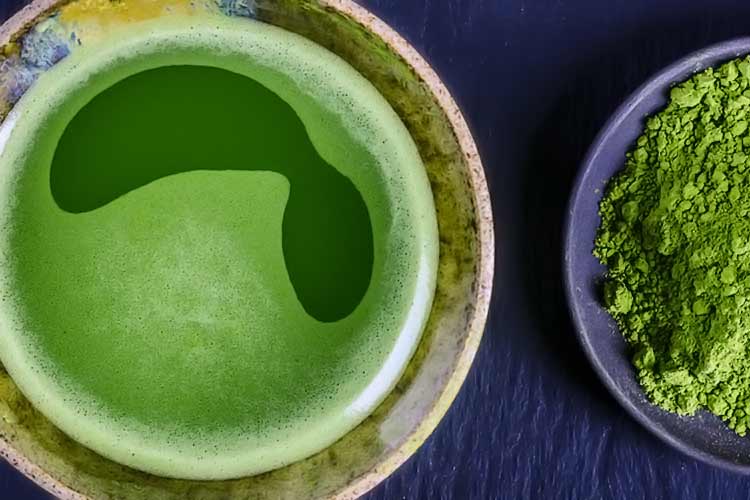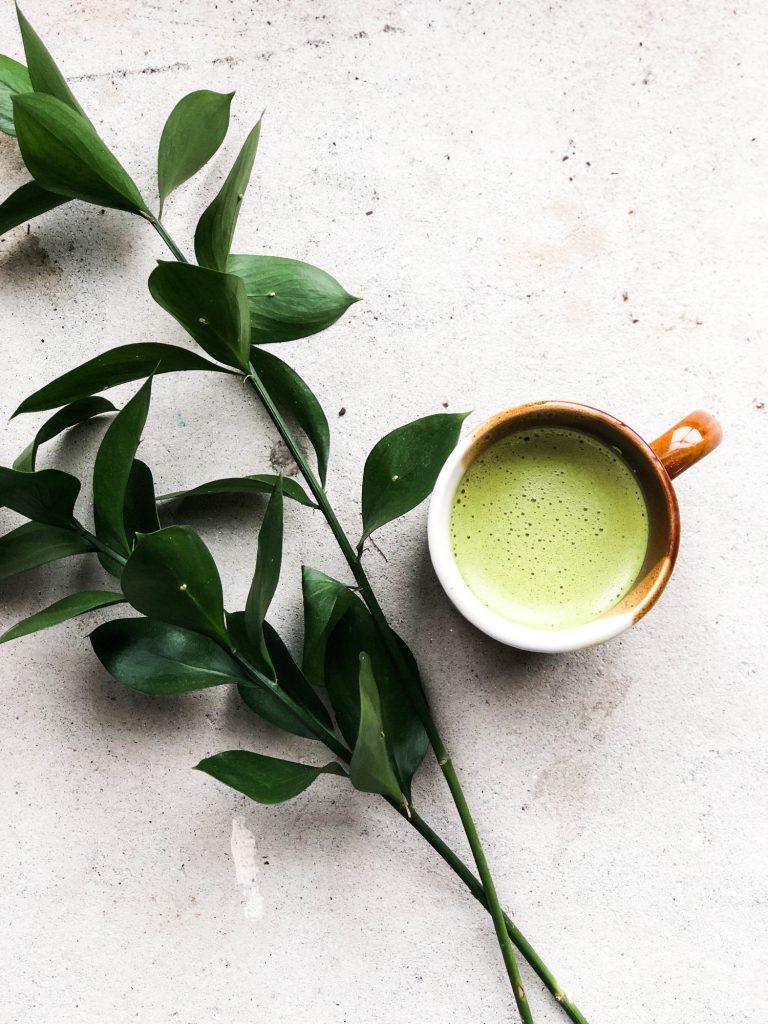We know how good green tea is for us but what if I told you there was something even better? That something is matcha. If green tea is good for us (and it is) matcha is even better. Let’s investigate this green health wonder together.
What is Matcha?
Matcha is green tea in powder form. The powder has been around since the 12th Century and is traditionally used in Japanese tea ceremonies. Matcha comes from both southern Japan and Southwest China. The growing process is exacting. The bushes the tea leaves grow on must be kept out of direct sunlight for 20-30 days before being harvested. This practice encourages the production of amino acids and increases the levels of chlorophyll which gives the leaves their dark green hue. The leaves are hand picked and steamed and the stems and veins are removed. The leaves are then dried and aged in cold storage and then stone ground to a find powder. The bright green powder has a bitter, grassy, earthy taste and is loaded with health benefits.
Matcha’s Many Benefits
Green tea is a healthy beverage but matcha is even better. It’s to do with the way matcha is consumer. When we drink green tea, we just drink the water the tea leaves have been steeped in. When we drink matcha, we are drinking actually ingesting the whole tea leaf. In fact, matcha contains more than 100 times the amount of antioxidants than regular green tea! This is what those leaves do for our bodies and minds.

Antioxidants-Matcha contains high levels of EGCG which is a potent catechin that can protect us from free radical damage and inflammation.
Better Skin– Matcha can help protect our skin from UV damage, a large factor in the premature aging of the skin. Matcha also stimulates elastin production which makes skin look plumper.
Fresher Breath– The antibacterial properties of matcha help kill the bacteria that are responsible for bad breath. Matcha can also keep our teeth healthy by preventing the buildup of plaque.
Chlorophyll-The chlorophyll in matcha can help eliminate heavy metals and other harmful chemicals from our bodies.
Immune Boosters-The rich mix of antioxidants, chlorophyll, L-theanine, and trace amounts of vitamins and minerals all work in harmony to boost and support our immune function.
Eye Health-The catechins in matcha may be absorbed by our eyes and reduce our risk of glaucoma and other vision problems.
Heart Health-The catechins in matcha can help keep our cardiovascular system healthy. A 2009 study showed that drinking three cups of matcha daily can prevent strokes. A similar study showed matcha can help reduce LDL cholesterol (the bad kind of cholesterol). And the antioxidants can maintain the health of our arteries.
Improved Cognition-The L-theanine and amino acids may improve memory, concentration, and mood as they increase the brain’s production of serotonin and dopamine.
Increased Energy and Endurance-Good news for you athletes. The healthy form of caffeine in matcha may boost energy and endurance levels.
But Calming Too-The L-theanine of matcha improves our brain’s production of alpha waves which bestow mental relaxation and a reduction in our stress levels.
Increased Fat Burning-Matcha may increase our metabolic rate which means our bodies burn fat more effectively. In fact, exercising immediately after drinking matcha may boost fat burning by as much as 25%!

What About Caffeine?
We often read dire warnings about caffeine but in appropriate amounts, caffeine is beneficial. And while matcha contains more caffeine than green tea, it contains less than coffee. The amount of caffeine in matcha won’t give you the same jitteriness that coffee often causes. Coffee can cause an energy peak followed by a slump, but matcha gives you the enhanced clarity and concentration you get with a coffee peak but without the slump thanks to the catechins and L-theanine. That said, it is recommended to consume matcha in the morning or early afternoon so the caffeine doesn’t interfere with your sleep.
What to Look For
All matcha is not the same. Quality depends on several factors including origin, type, and grade. And quality matcha is not cheap. High quality matcha powder ranges from about $15 to $25 for 1.5 ounces. That amount is equivalent to 20 to 25 cups of matcha tea. If you see matcha priced much, much lower than that, it is likely of low quality or full of fillers. You can buy ceremonial grade matcha and culinary grade. Ceremonial is the highest quality available, more expensive, and less bitter than culinary grade. Ceremonial grade is what should be used to make matcha tea. Culinary grade matcha will have a more bitter taste and cost less than ceremonial grade. Use culinary grade matcha for flavoring other foods and adding to smoothies. Be sure to check all labels for added ingredients like sugar or powdered milk. The only thing on the ingredient list should be matcha.
Easy as 1,2,3
Making a health-giving cup of matcha is easy. Matcha powder can clump so sift 1 to 2 teaspoons of the powder (depending on how strong you prefer your drink) into a mug. Add 1 to 2 ounces of hot but not quite boiling water. Use a bamboo matcha whisk called a chasen to vigorously whisk the powder and water in a zig-zag motion for 15 to 40 seconds. This motion creates a nice, frothy cup of matcha tea ready for drinking. Matcha powder makes a great addition to smoothies, chia pudding, overnight oats, energy balls, protein pancakes and many other dishes. A quick look at Pinterest will give you endless ideas for making matcha a regular part of your diet.
Ancient Meets Modern
Matcha has been around for hundreds of years but it’s only fairly recently that we in the West have discovered its many benefits. Matcha is exotic, comforting, versatile, healthy, and above all delicious. This ancient powder should have a prominent place in every modern kitchens. Bottoms up!
